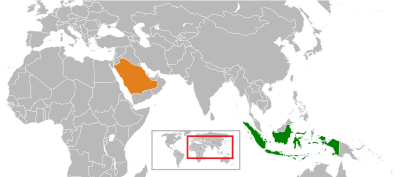
Search
Indonesia–Saudi Arabia relations

Indonesia and Saudi Arabia established diplomatic relations in 1950. Relations (Arabic: العلاقات السعودية الإندونسية, Indonesian: Hubungan Arab Saudi dengan Indonesia) are particularly important because Saudi Arabia is the birthplace of Islam, and Indonesia is home to the world's largest Muslim population; both are Muslim majority countries. Economy and trade relations are also particularly important, especially on oil (energy) and human resources (migrant worker) sectors. Saudi Arabia has an embassy in Jakarta, while Indonesia has an embassy in Riyadh and a consulate in Jeddah. Both countries are members of the Organisation of Islamic Cooperation and G-20 major economies.
History
The historical link between Indonesia and Saudi Arabia was Islam. Numerous Muslim traders and ulamas arrived in the Indonesian archipelago from the Arab World during the coming of Islam around the 13th century. The earliest evidence of an Indonesian traveling to Mecca can be seen from a late 15th-century Yemeni biography, the person was described as a "Jawa" and was travelling sometime between 1277 and 1367 CE. Groups of Acehnese were recorded to live in groups in the Hejaz since at least the early 17th century. Continuing into the early 20th century, Indonesian Muslims have taken the hajj pilgrimage to Mecca. As the country with the largest Muslim population, Indonesia sends the largest number of hajj pilgrims among Muslim countries. Official diplomatic relations between Indonesia and Saudi Arabia were opened in 1950.
The two countries signed a defense cooperation agreement in late January 2014. The agreement largely covers force training and counter-terrorism.
The Indonesians improved relations with Saudi under Joko Widodo's administration, this was exemplified when the president was awarded with the Order of Abdulaziz al Saud in 2015 by the Saudi authorities.
Trade
In 2008, bilateral trade reached nearly US$6 billion. Because of its oil and gas exports, the trade balance is heavily in favor to Saudi Arabia, while Indonesia mainly exports plywood, textiles, apparel, palm oil, paper and tires.
Migrant workers and human rights abuses
Saudi Arabia is a major employer for thousands of Indonesian workers, mostly in the domestic sector as house maids. As of 2018, there are around 600,000 Indonesians working in Saudi Arabia. However, there are reports of abuses of Indonesian migrant workers by their Saudi Arabian employers. There are reports of physical abuses, and some led to the death of Indonesian maids. Most of the time, justice was not enforced in Saudi Arabia as the abusers have rarely faced punishment greater than a fine. Some of these cases have attracted worldwide attention.
Another problem is the number of Indonesian workers facing death row in Saudi Arabia. These Indonesian maids have been arrested on alleged charges of murder, witchcraft and sexual offenses. In June 2012, around 32 Indonesian housemaids were arrested and held under death sentences. A few maids were sentenced to death earlier.
High level visits
- Indonesian President Sukarno visited Saudi Arabia in 1955.
- King Faisal of Saudi Arabia visited Indonesia on June 10 to 13, 1970.
- Indonesian President Joko Widodo visited Saudi Arabia on 12 September 2015.
- King Salman of Saudi Arabia visited Jakarta, Bogor, and Bali, Indonesia, on March 1, 2017.
See also
- Foreign relations of Indonesia
- Foreign relations of Saudi Arabia
- Capital punishment in Saudi Arabia
Notes
External links
- Embassy of the Republic of Indonesia in Riyadh, Saudi Arabia
- The Embassy of Saudi Arabia in Indonesia
Text submitted to CC-BY-SA license. Source: Indonesia–Saudi Arabia relations by Wikipedia (Historical)
Owlapps.net - since 2012 - Les chouettes applications du hibou




